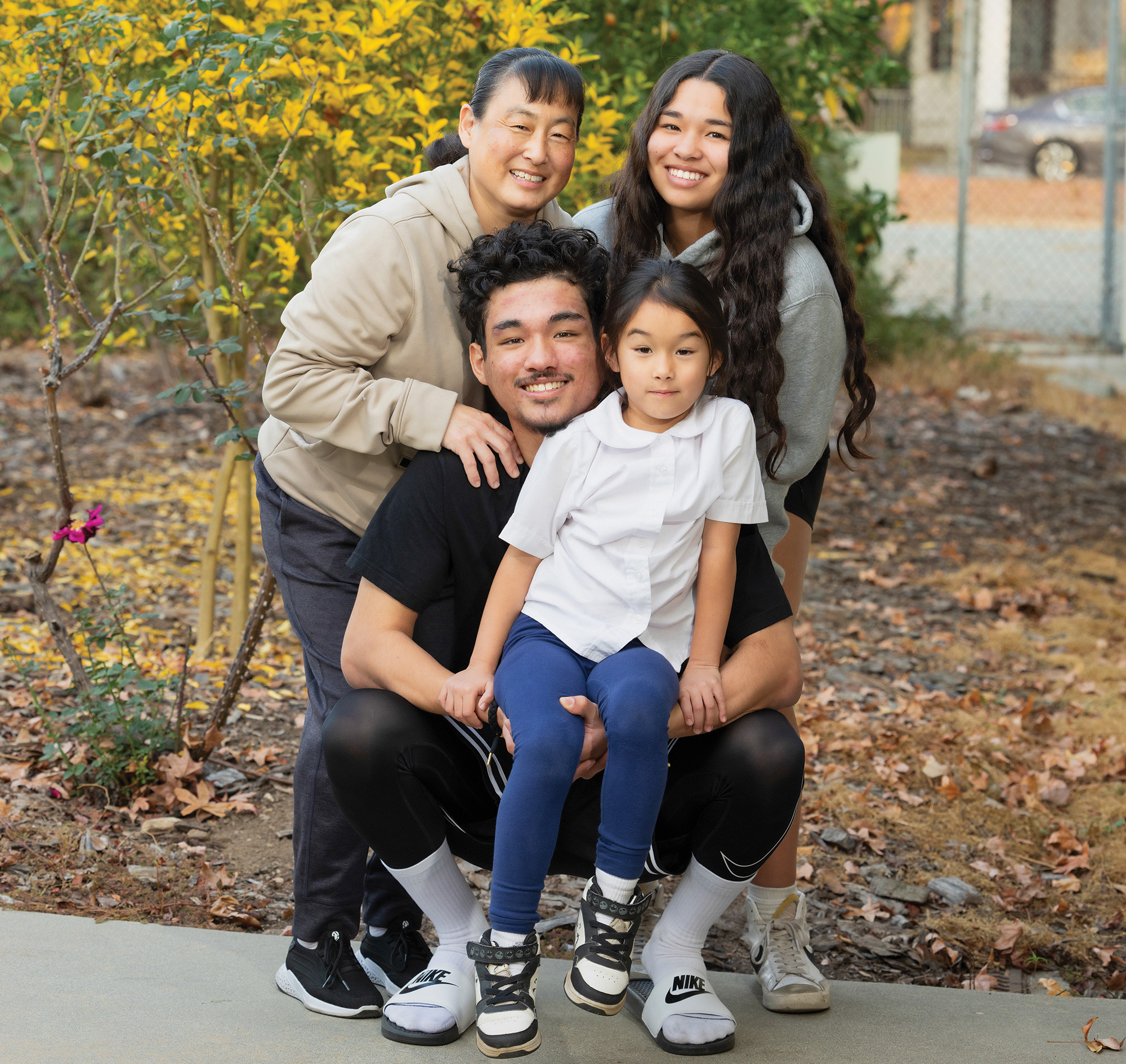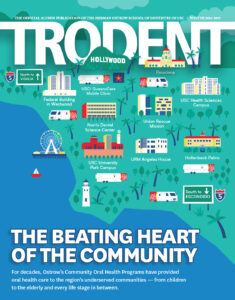
TRODENT COVER STORY (2 of 5)
A FAMILY AFFAIR
Financially devastated years ago by identity theft, L.A. resident Deborah Clark relied on the USC Mobile Dental Clinic to keep her children’s smiles healthy.
BY JAMIE WETHERBE MA ’04
AFTER BEING STATIONED OVERSEAS in Afghanistan, Deborah Clark returned Stateside to a shock — she had been a victim of identity theft, starting as early as 2004. “I came back to the States, and I had all these notices from debt collectors,” she says. “I had been destroyed as a human being, financially.”
Clark discovered in 2012 that tens of thousands of dollars of debt had been taken out in her name — and is still learning about more. “I lost my job within the government sector,” Clark says. “I lost everything.”
Without income, Clark couldn’t keep her home, and with damaged credit, she couldn’t rent an apartment either. “We were homeless more than once,” says Clark, who had young children at the time. “It was devastating for my family to have to live through this — I would never wish this upon anybody.”
To maintain her children’s well-being, Clark turned to services like Young & Healthy in Pasadena, which connects underserved children with free medical, dental and psychological care. The nonprofit has partnered with USC Mobile Dental Clinic for decades to identify children and young adults who qualify for free dental services.
Looking Into the Eyes of a Child
Staffed by a team of USC dental students, faculty and staff, the USC Mobile Dental Clinic has provided oral health care to underserved communities in Southern California for nearly 60 years, serving more than 100,000 young people to date.
“Our families face many hurdles, such as financial hardship, lack of transportation, no access to quality dental care, language barriers and trusting the healthcare providers,” says USC Mobile Dental Clinic Director Sanaz “Sunny” Fereshteh DDS ’09. “We remove the obstacles of accessing much needed dental care for the families we serve.”
Over the course of week-long engagements, some 30 dental students offer cleanings along with a range of treatments, from prosthodontic reconstructions to root canals, to up to 120 children and their families.
“It can often feel like organized chaos,” says Fereshteh, who’s worked at the clinic for more than a decade. “However, looking into the eyes of the child in your dental chair is the perfect reminder of why we are here. It pushes everything else out of my mind, and I can refocus on someone else that has given me their trust to care for them.”
When Clark first arrived at the clinic in early 2020, she didn’t expect much more than a cleaning for her three of her four children.
“I didn’t realize the care was so in-depth,” she says. “The students are phenomenal. They treat everyone with nothing but respect and kindness — and try to make it fun.”
Empathy and Understanding are Paramount
In their fourth year of dental school, students are required to complete at least one one-week rotation with the USC Mobile Dental Clinic as part of their community program requirements. Still, many students choose to start in supporting roles as soon as their first year, and often students opt to volunteer throughout their four years at Ostrow.
“I believe when students actively participate in the mobile clinic, they are reminded of the privilege and power we have as dental care providers,” says Fereshteh, who started volunteering at the mobile clinic her first semester as a dental student at USC. “We can see the impact of our actions when we take a patient out of pain or make a child feel more comfortable, ensuring they’ll have more confidence at their dental visits for the rest of their lives.”
In addition to watching patients’ progress, Fereshteh enjoys the opportunity to see students evolve throughout their dental education.
“I get to see their fast growth over the years, going from being shy and nervous — and sometimes sheltered — students to building incredible confidence, compassion, understanding and true empathy for the people we care for at the mobile clinic,” Fereshteh explains. “Knowing that they are taking these invaluable characteristics into their long careers is incredibly rewarding and gratifying.”
Empathy and understanding are paramount when treating the clinic’s unique patient population. “When we are in Los Angeles County, 15 to 20 percent of our patients have never seen a dentist,” Fereshteh says.
“When we’re serving migrant workers in Kern, Tulare or San Diego Counties, that number increases to more than half.”
Inspired to give back
Clark has experienced this level of compassion and care firsthand. During a recent visit, her youngest, now 5 years old, refused to open her mouth for a filling. “A young gentleman who’s specializing in pediatrics came over and miraculously got her to cooperate,” Clark says.
Two decades after her identity was stolen, Clark and her family continue to pick up the pieces. “Our lives are a lot better now,” she says. “But if it weren’t for programs like the mobile clinic, my kids’ welfare and well-being wouldn’t be where they are today.”
Her oldest daughter (not pictured above) is now in graduate school studying to work with children with special needs. “She wants to go into a field where she can give back,” says Clark. “Just like the students at USC.”

CHILDREN
Ages: 0-18
Treated at: USC Mobile Dental Clinic (including QueensCare Mobile Clinics and the Neighborhood Mobile Dental Van Prevention Program) and various community sites
Fast facts:
▶ Poor oral health can impact academic performance. More than 440,000 Californian K-12 students missed school due to dental problems, according to Smile California.
▶ Students with toothaches are almost four times more likely to have a low grade point average.
▶ Parents averaged 2.5 absent days from school or work annually due to their children’s dental problems.
